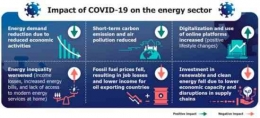"A leader is one who knows the way, goes the way, and shows the way"
(John C. Maxwell)
Managing Director IMF Kristalina Georgieva mentioned that Indonesia become one of the bright spots amid the global economic gloom in the Q2 2022. She mentioned that Indonesia is able to maintain the economic stability by achieving the stable economic growth and control the inflation rate. During economic recovery after pandemic, Indonesia economy still positively growth although the global economy facing challenge in combating the economic downturn due to energy crisis, political tension, and war.
In contrary, we all see that increase the price of three fuel types (Pertalite, Pertamax, and Solar) up to 30% since 3 September 2022 by Ministry of Economy negatively impacted to the low-income people due to the increasing of commodity prices (food and staples). The changes of fuel price already happen seven times during President Jokowi era. Moreover, this fuel price rise is having false momentum because the regulation enacted during the economy recovery process after pandemic and the amid decrease of world fuel price. Research from Baker et al. (2022) found that the energy sector still in the gloom situation in this post-pandemic period. The world crude oil price is cut down due to the decrease of world oil demand and fear of future economy crises. The data from Oil Market Report shows that Brent crude oil futures slipped below USD90/bbl in early September 2022, the lowest level since January and more than USD34/bbl below price peak level on June (Oil Market Report, 2022).
The increase of fuel price already devastated the transportation sector make price of goods more expensive, accelerated the inflation rate. It has impacted low-income people to afford the basic necessity (food) and hike up the number of poor people. The main negative impact from Indonesia fuel price increase is the rising of domestic inflation. The data shows that inflation before fuel price is rise from August 2022 is 4,69% and it becomes 4,84% after the fuel price rise in September 2022 (BPS, 2022). The economist Mohammad Faisal (Executive Director of CORE Indonesia) predicted that the number of poor people increase up to 1 million after fuel price rises. Not only that, the difficulty in finding jobs also worsen the condition which makes the number of unemployed people rises.

To tackle the negative impact of fuel price increase, the government doing the conventional approach which is only temporary solution by distributing the Cash Transfer Program (BLT) and wage subsidy assistance (BSU) as compensation for the poor people and worker with salary less than 3.5 million IDR. However, this policy is only affecting the short period of time for the poor and blue-collar worker. It only able to increase purchasing power and maintain the level of welfare of worker for certain period of time. The disbursement of BLT is considered slow, sometimes mistargeted, and unable to covered all the poor people. The small amount of BSU which is 600 thousand IDR and one-time payment only able to cover for the needs of worker in a month or less. The main solution for minimizing the negative impact of fuel price rise is definitely by increasing the job opportunity, accelerate the business recovery (which has been slow growth during pandemic), and increasing the minimum salary for vulnerable worker (labourer, freelancer, daily worker, etc).
Although the worker already stage protest and demand the government to increase their wage 13%, there is no salary increase regulation enacted yet. Rather than increase the salary, the government enacted salary subsidies regulation[1] just two days after fuel price rises policy announced. The increase fuel price which also make the bank adjusted the interest rate also will hamper the business growth. It will make the businessperson which want to lend the money become paying more interest rate since bank increase the loan interest. It will hamper the business growth and the business recovery process in the post-pandemic.
To be concluded, the government needs to reform their regulation and having more long-term policy impact to the low-income people (poor and blue-collar worker). Rather than just spending the state budget for temporary subsidy, the government needs to have more comprehensive approach for solving fuel price issue through creating more job opportunities and enhance the purchasing power in the long term period.
About Author
Wida Reza Hardiyanti
Alumni Faculty of Economics and Business Gadjah Mada University. Currently being an independent researcher and consultant. The research topic focus on economic development and law protection for marginalized people (disabled, elderly, and women).
References
BPS. 2022. Inflation in September 2022. Accessed from https://www.bps.go.id/pressrelease/2022/10/03/1865/inflasi-terjadi-pada-september-2022-inflasi-sebesar-1-17-persen--inflasi-tertinggi-terjadi-di-bukittinggi-sebesar-1-87-persen-.html
Oil Market Report September 2022. Accessed from https://www.iea.org/reports/oil-market-report-september-2022
Pertamina. Fuel Price in Indonesia. Accessed from https://mypertamina.id/fuels-harga
Zakeri et al. 2022. "Pandemic, War, and Global Energy Transitions". Energies, 15(17), 6114. Accessed from https://www.mdpi.com/1996-1073/15/17/6114
Baca konten-konten menarik Kompasiana langsung dari smartphone kamu. Follow channel WhatsApp Kompasiana sekarang di sini: https://whatsapp.com/channel/0029VaYjYaL4Spk7WflFYJ2H








